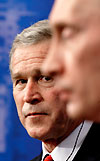|
Shadows still hang over US-Russian ties
(Xinhua)
Updated: 2005-02-26 01:57
BRATISLAVA: Amid tensions over Iran and the state of democracy in Russia, US President George W. Bush and Russian President Vladimir Putin on Thursday wrapped up in the Slovak capital Bratislava their first summit of Bush's second term, with both sides playing down differences and vowing to further enhance their "strategic" partnership.
 |
| U.S. President George W. Bush listens to Russian President Vladimir Putin during a joint press conference at Bratislava Castle in Slovakia, February 24, 2005. [Reuters] |
At a joint news conference after their talks, which analysts believe are a barometer for calculating how Washington is likely to deal with Russia during Bush's new term, Bush and Putin tried to avoid issues that could cause rifts by claiming that they "see no alternative to the constant strengthening of Russian-US relations."
Stressing that he appreciated the frank nature of his talks with Putin, Bush said he and Putin agreed on a plate of issues such as Iran, the Democratic People's Republic of Korea (DPRK), control on Man-Portable Air Defence Systems, co-operation on nuclear security, fighting terror, boosting the peace process in the Middle East region, as well as Russia's entry to the World Trade Organization.
The summit came as US-Russian relations soured over Russia's opposition to the US-led Iraq war and further cooled amid US concerns over Putin's domestic policy and Moscow's stance towards Iran, which Moscow believed was not trying to build nuclear weapons while Washington insisted that it was.
Most recently, the events in neighboring Ukraine which brought Western-leaning President Viktor Yushchenko to power have again stirred Russia's fears of encirclement.
Yet suggestions from Bush and Putin on Thursday that they would continue to "nurture and work" their relationship might strengthen the argument that US-Russian relations might have been dominated by a more pragmatic spirit.
"In a second Bush term, it should be expected the United States will continue to only engage Russia in areas of common interest, war on terrorism, weapons proliferation, energy co-operation and trade," Peter Lavelle, an independent Moscow-based analyst once pointed out.
Russia, a member of the diplomatic "quartet" seeking peace in the Middle East and involved in the six-party talks aimed at solving the DPRK nuclear issue, could also become America's partner on a number of geopolitical issues in the Middle East and South Asia, some analysts said.
For Russia, they believed, to be on good terms with America in the foreseeable future is important for ensuring a healthy economic development and enhancing its international status.
Russia, which continues to look to the West, is still counting on the US support for its membership of the World Trade Organization, they said.
"For Russia, relations with the United States have been and will be truly strategic... There is no place for Nellies, who are eager to bring some objective difficulties, imperfections or sometimes disagreements to the forefront," the Interfax news agency quoted Kremlin foreign policy adviser Sergei Prikhodko as saying before the Bush-Putin summit.
Yet others argued that although America and Russia said disagreements over Russian democracy, Iraq and Iran's nuclear programme would not hurt their mutual links, there are still some problems facing this "alliance of convenience."
Disputes between Russia and America over Iran are still on the table as Russia is convinced that Iran had no intention of making nuclear weapons and Moscow would continue to co-operate with Teheran on nuclear energy, which flatly contradicted Washington.
There are also US concerns over Russia's stance towards Syria after Moscow announced last week it was planning to sell the Strelets anti-aircraft systems to the country amid US concerns that weapons technology could fall into the hands of militants.
Further more, it has been noticed that Bush, who made spreading democracy and freedom a key slogan of his second term and urged Putin to "renew a commitment to democracy and the rule of law," expressed his "concerns" over Moscow's approach to democracy during his talks with Putin, who insisted democracy must fit Russia's present level of development, Russia's history and traditions.
The way the US-Russian relations move would be affected by the democracy issues that create difficulties in the relationship, analysts said.
"The US no longer views Vladimir Putin as a democrat, at least in the way this word is understood in the West... Sooner or later, the Kremlin's actions will come into conflict with the interests of America and its allies," Nikolai Zlobin, director of Russian and Asian Programs at the Centre for Defence Information in Washington, D.C., said in an article published by Global Affairs.
(China Daily 02/26/2005 page4)
|